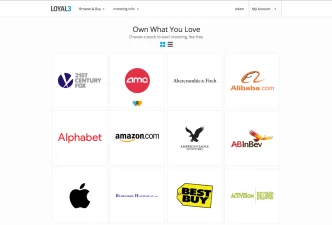
Loyal3 is without a doubt my favorite free broker. If you are considering signing up for another brokerage and all you really want to do is own a handful of mega-capitalization stocks, you might consider looking into loyal3. The foremost advantage of the loyal3 platform is that it allows users to trade a handful of stocks for free. Additionally, they occasionally allow their customers to participate in IPOs of companies which are going public.
Stock purchasing
Free stock trades are a big advantage for folks investing small amounts of money. Loyal3 allows trades as small as $10. They even allow the purchase of fractional shares. Similarly it is quite easy to set up a recurring monthly purchase. The interface to view the stocks is really smooth. It seems devised to keep the focus of the customers strictly on ownership rather than trading. When you log in on a down day you don’t see a bunch of red numbers staring you in the face. In fact you have to do a little work to figure out which positions have lost money or made money. These little differences make the psychology of investing substantially easier. Anything that makes individual investors less panicky is good in my book. It encourages all of the thinking an investor ought to have. Just sit back, make regular contributions, hold forever.
Limits
As of this writing there are only 67 companies available for purchase. Further they are focused in segments that have a great deal of interaction with the general public, such as entertainment, retail, and electronics. You don’t see any oil companies on here, which is a disappointment as the volatility in oil companies can make them great candidates for buy and hold. It would probably be unwise to build a portfolio out of only the stocks available on loyal3. That being said one option would be to use loyal3 in cases where a dividend reinvestment plan has unacceptable fees. You could use a mix, of say an exxon mobile dividend reinvestment plan, a BHP billiton dividend reinvestment plan, and loyal3 automatic purchases on Berkshire Hathaway, Hershey’s, Coke, Microsoft, Amazon, and Wal-mart. One could spend a little time and construct a more diverse portfolio, but someone 30 years from now probably wouldn’t be dissatisfied with the results. All in all, you would probably be safer with a simple index fund, but if investing a tiny bit at a time in individual companies and holding them for the rest of your life appeals to you loyal3 could be a strong choice, just make sure you’re also doing something else sensible.
Initial Public Offerings (IPOs)
The other major part of loyal3 is the ability to directly participate in initial public offerings (IPO) of companies which are going public. In an IPO a company, let’s call it Twitbook, sells a certain number of shares to institutional investors, who agree to buy these shares in a given price range. The institutional investors then sell the shares on the public market. The institutional investors provide Twitbook with certainty regarding the amount of money they will receive for the shares they are selling. Twitbook doesn’t want to drop 10% of their company directly on the exchange and end up selling it for substantially less than they originally thought. By agreeing in advance to a price range the institutional investors let twitbook know that they’re going to get at least X dollars from the IPO. All that being said, in general, participating in a random IPO should make you money on average. The price is negotiated by institutional investors who are only willing to participate because they plan on selling the newly-minted shares of stock to the general investing public at a profit. The loyal3 platform allows you to adopt the role of an institutional investor. This can be an attractive proposition, assuming that you can accept the risk, and that the IPO’s that loyal3 participates in are similar to the average company which IPOs. This is a big caveat and time will tell if loyal3 is simply getting you a seat at overpriced IPOs.
Generally IPO’s are high risk. These are young companies which need to raise cash. Alternatively, the current owners of the companies are seeking a more liquid market to sell their shares in. You should ask yourself, if the people most knowledgeable about the company want to sell, why do I want to buy? Hopefully it’s clear that this isn’t an area one should go crazy in. Please don’t invest all of your money in an IPO. Please don’t invest any money that you wouldn’t mind setting on fire in an IPO.
Overall, I like the brokerage. It has some very specific niche uses but it does them pretty well. It will never be my largest account, but if you want to get in on an IPO, or cheaply create a small portfolio of entertainment companies I can’t think of a easier way. Finally, if all this sounds good and you want to buy some stock through Loyal3, feel free to use this link.
Adam Woods is a physicist. His research interests include building software to run and build geomagnetic models. Adam got interested in personal finance in the great recession when it became obvious an interest was necessary.
After harassing his friends and family (and a short intervention) he took to the web where he blogs about finance, investment, politics, and economics.
Adam is currently located in Boulder, Colorado where he can generally be found hiking, biking, or running a D&D campaign. He can also be contacted at adamwoods137@gmail.com.
